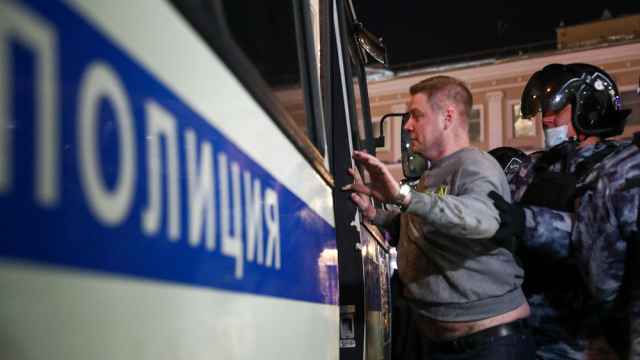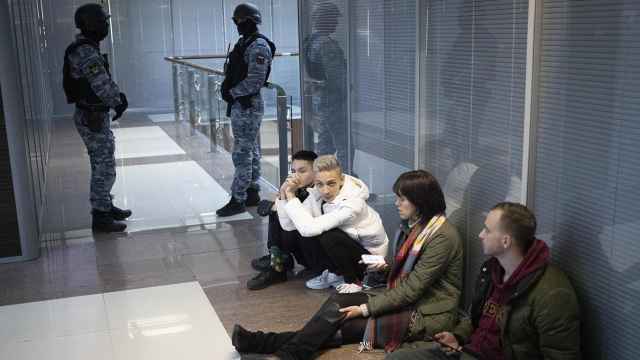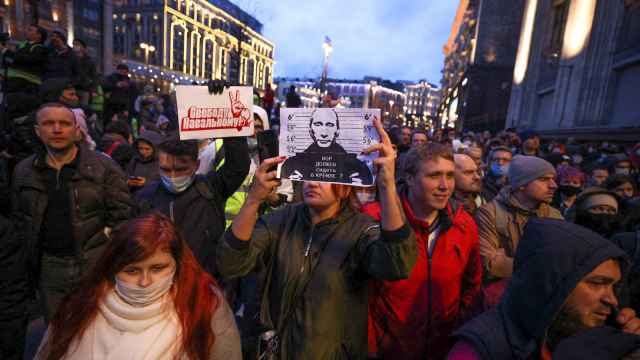Читайте русскую версию здесь.
The cold temperatures and heated political passions of summer are now behind us. Most of the leaves have fallen from the trees, lingering cold rains have come, and Moscow’s large-scale protests have given way to the gloomy spectacle of picketers in the lobbies of outlying metro stations staging lonely vigils in defense of political prisoners.
Meanwhile, the repressive measures of the authorities have not only survived the demonstrations, but have gained new impetus with the addition of more detainees.
Against this almost theatrical backdrop stand the immense and far-reaching machinations of the FSB. For weeks on end, there have come almost daily reports of how the agency has frozen all the bank accounts of yet another activist — and oftentimes, that person’s relatives as well. The same tactic is applied against journalists and business people who have expressed support publicly for opposition leader Alexei Navalny.
These reports have accumulated with such rapidity as to become a huge and faceless mass, even to the politically savvy members of the hardcore opposition. Who, for example, recalls the name of the mother whom the authorities punished by confiscating the money she had saved for a disabled child?
Social network users have tried to lighten the mood, telling and retelling every possible joke about activists who were fined so heavily that they now have negative bank balances in the tens of millions or even billions of rubles. But each of these people now has no bank card and it remains unclear how they can even buy food. What is funny about that?
All jokes aside, one might ask what, in general, is happening in Russia. Not only have the authorities frozen the bank accounts of hundreds of activists in different regions, but in Kafkaesque, almost surreal fashion, the Moscow courts have presented a dozen bills to Navalny and his associates for imaginary sums owed to restaurants, public transport, and even the police.
Is this how the authorities take revenge for attempts to hold “smart voting” and for staging protests in Moscow? Is it the tightening of screws — that will intensify as the 2024 presidential elections approach?
Some political observers point out that neighboring Belarus long ago perfected the method of bankrupting the opposition. The truth, though, is that all the former Soviet republics possess a full repertoire of political tricks and have used it often. The only real innovation now comes not from the authorities, but from the opposition with its “smart voting.”
There is nothing new about the repressive measures now applied against Navalny’s organization, Navalny himself, and his closest associates. They are simply the logical outcome of the political system President Vladimir Putin has been building for the last 20 years.
The authorities are essentially declaring, “You must keep up appearances. You can break the spirit, but not the letter of the law.” In this sense, Putin — a law school graduate — is clearly a legalist.
All political repression in post-Soviet Russia has hidden behind a formal façade. Unlike their tsarist and Soviet predecessors, today’s leaders prefer pretending that Russia has no political prisoners and that rulers do not dictate court rulings. Of course, Russia does have political prisoners and the courts are not independent. But like the tale of the emperor’s new clothes, most Russians simply go along with the farce and act as though the emperor is not actually naked.
That is why former Yukos CEO Mikhail Khodorkovsky and Navalny’s brother were imprisoned on trumped up criminal charges and why others who oppose the authorities are accused of fomenting unrest, extremism, drug trafficking or anything else but political crimes.
Above all else, the authorities want to keep up appearances.
Why throw hundreds of thousands of people into forced labor camps when you can more easily block them from holding jobs, force them into bankruptcy, or carry out a hostile takeover of their current place of employment? This is what makes today’s capitalistic authoritarianism more humane. Only a few discontents get prison terms to frighten the rest into submission. Cases of torture remain the exception, and it is difficult to believe the Kremlin would orchestrate such measures.
Forcing political opponents into poverty allows government officials to deny any responsibility for their victims’ suffering, to blame their hardships on impersonal market forces. “Capitalism can be cruel,” they say.
I experienced this firsthand in January 2014 when the Dozhd TV channel where I worked as the site’s chief editor lost all of its major advertisers. The formal reason for their departure was economic: cable networks suddenly – and supposedly voluntarily — stopped carrying our programs, although the directors later called to say they had been forced to drop us.
As a result, I had to rent a less expensive apartment and scrimp on food for a time. I must admit, however, that getting shot would have been far worse.
A Message from The Moscow Times:
Dear readers,
We are facing unprecedented challenges. Russia's Prosecutor General's Office has designated The Moscow Times as an "undesirable" organization, criminalizing our work and putting our staff at risk of prosecution. This follows our earlier unjust labeling as a "foreign agent."
These actions are direct attempts to silence independent journalism in Russia. The authorities claim our work "discredits the decisions of the Russian leadership." We see things differently: we strive to provide accurate, unbiased reporting on Russia.
We, the journalists of The Moscow Times, refuse to be silenced. But to continue our work, we need your help.
Your support, no matter how small, makes a world of difference. If you can, please support us monthly starting from just $2. It's quick to set up, and every contribution makes a significant impact.
By supporting The Moscow Times, you're defending open, independent journalism in the face of repression. Thank you for standing with us.
Remind me later.








